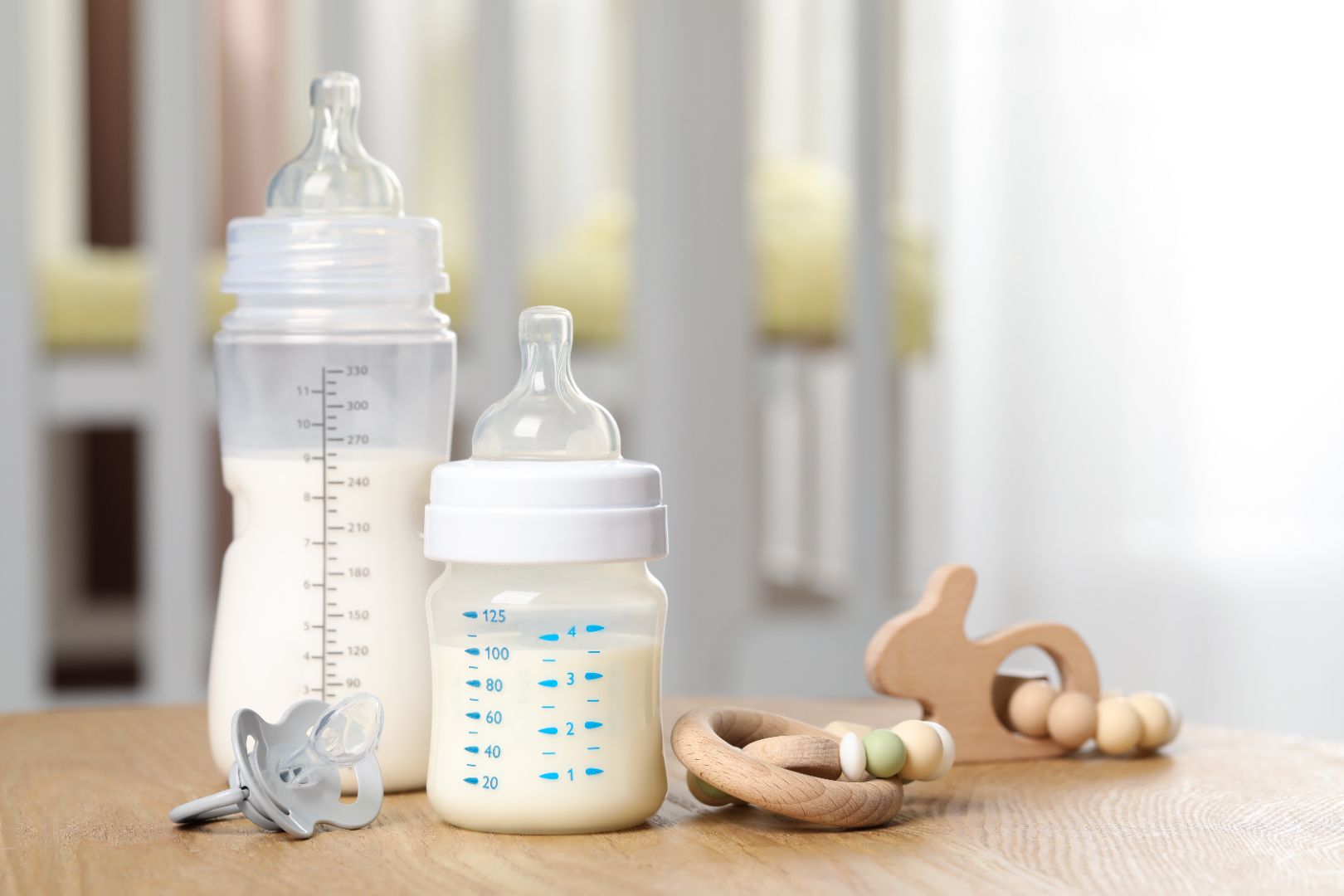Published June 20, 2024

Your Guide to Switching Baby Formula: Tips, Side Effects and the Adjustment Period
Parenthood is an adventure with seemingly endless decisions, and finding the right baby formula is no exception. It’s an important part of your baby’s health and happiness, after all! If your current formula doesn't seem to be working for your little one, it might be time to explore other options until you discover the perfect match.
Read on to learn everything you need to know about switching to a new baby formula, including practical tips for a smooth and successful transition.
How Do You Know When It’s Time To Switch Formulas?
Finding the best baby formula can be tricky, because babies can’t exactly tell you what they want. So, it’s not only common but often necessary to try out different formulas until you land on the right one that meets your baby's needs. There are a few main reasons why you might think about switching formula brands, such as:
You Recognize Allergic Reactions and Intolerances
Sometimes, you may start to notice unexpected reactions in your baby - even if they have previously tolerated a formula. Signals like rashes, hives or digestive discomfort may point to an allergy or intolerance to certain ingredients. The nonprofit Food Allergy Research and Education reveals that nearly 3% of U.S. infants develop a food allergy in the first year of life. If you think this might be what’s happening, you can explore alternative formulas tailored to your baby's sensitivities with your pediatrician’s guidance.
You Want To Address Digestive Issues
Digestive discomfort, such as gas, colic or constipation, can disrupt your baby's comfort and happiness. If you notice telltale signs of an unhappy stomach, switching to a new formula specifically designed to ease digestion might provide relief for your little one — and a smoother feeding experience for you.
Your Pediatrician Recommends a Change
Pediatricians play a crucial role in guiding your baby's health journey. If your family physician suggests a change in formula because of health concerns or specific nutritional requirements, be sure to listen to their expert advice and ask questions as needed.
You’re Running Into Formula Shortages
If a formula shortage makes it hard to get your hands on your preferred option, explore readily available baby formula brands or types so your baby’s feeding routine remains uninterrupted.
You’re Considering Your Baby’s Preference
Just like adults, babies have preferences, too! Some may show a clear liking for the taste of one formula over another. Paying attention to your baby's cues can guide your decision-making process when exploring alternatives.
Still not sure if it’s time for a new formula? Take a closer look at indications that your little one could benefit from a switch:
-
Slow weight gain: If your baby isn't gaining weight as expected or is falling behind on their growth curve, talk to your pediatrician about a change in formula. Sometimes, slow weight gain is due to malabsorption as a result of allergy-related inflammation in the gut, and a hypoallergenic formula may be needed.
-
Refusal to feed: A sudden aversion to feeding or consistent fussiness during mealtimes could mean your baby has difficulty with their current prepared formula.
-
Frequent spit-ups: While some spit-ups are normal, experiencing continuous problems and worsened spit-up could mean that the formula isn't sitting well with your baby's stomach.
-
Vomiting: It can be distressing to see your child experiencing persistent vomiting, especially if it seems forceful or projectile-like vomiting. This could be a sign that your baby is having trouble tolerating their current formula, or it could be a symptom of a larger issue such as illness or pyloric stenosis. Always consult with your pediatrician if you see vomiting with force in your infant.
-
Excessive crying or irritability: If your baby seems unusually fussy, cranky or inconsolable, this might be a result of discomfort or digestive issues related to their regular formula.
A Guide to Transitioning Your Baby to a New Formula
We know that formula feeding can be a challenge in its own right. So, it’s natural to feel a bit apprehensive about changing formula types. However, it's all about prioritizing the long-term health and happiness of your child.
If making the switch feels daunting, here are steps you can take for an easy transition from your baby's old formula to a new one:
Research All of Your Options
Start by gathering information about different formula brands and types available at your local stores or go-to online retailers. Consider factors like their ingredients, nutritional composition, and any specialty formula designed for specific needs like lactose intolerance or reflux. Read reviews from other parents and check in with your pediatrician for recommendations tailored to your baby's unique requirements.
Gradual Introduction: How To Mix New and Old Formula Brands
Alway be sure to ask your child's healthcare professional about when and how to make a transition. Transitioning to a new formula gradually may help your baby adjust more smoothly. Start the process by mixing small amounts of the new formula with the old one, slowly increasing the ratio of the new formula over several days to weeks. A leisurely transition allows your baby's digestive system to adapt and may minimize the chances of an upset stomach or refusal to feed. Keep track of how your baby responds to each blend and adjust the ratio as needed until they’re used to the formula switch. However, if you are switching formulas due to diagnosed or presumed allergy, it’s typically best to switch immediately in order to remove exposure to the allergen.
A Recommended Feeding Schedule For Changing Formula
Make sure you maintain a consistent feeding schedule to see a successful transition. This also helps your baby get the nutrition they need throughout the day. You may wish to avoid introducing other changes at this time. Maintaining familiar routines while slowly introducing a new formula can help you understand if the changes you are making can be attributed to the formula. Consistency and patience are really important as you switch formula types, so be prepared to adjust your schedule based on your baby's cues and reactions.
Monitor Your Baby’s Reactions and Adjust As Needed
Watch your baby for any signs of discomfort, allergic reactions or changes in feeding behavior when making the switch. Keep a journal to track your baby's feeding patterns, reactions to the new formula and any changes made along the way. If you notice continuing or concerning symptoms, it’s best to speak with your pediatrician for guidance.
What Can You Expect During the Switch?
The transition will naturally be different for every child. However, there are things to keep an eye out for and ways to keep your little one comfortable throughout the switch.
Normal Adjustment vs. Signs of Intolerance or Allergy
While some degree of adjustment is normal during a formula switch, work with your child's healthcare professional to help you differentiate between typical adaptation and signs of intolerance or allergy. Keep in mind that regular adjustment may involve symptoms that usually improve over time, which requires patience. However, persistent or severe symptoms could indicate an intolerance or allergy to ingredients in the new formula. Here are some warning signs to look for:
- Persistent vomiting.
- Excessive diarrhea.
- Severe rash or hives.
- Respiratory issues.
- Persistent fussiness or irritability.
- Blood or excess mucus in stool.
- Poor weight gain or failure to thrive.
- Unusual behavior or lethargy.
If you suspect your baby is experiencing an adverse reaction, consult your pediatrician for guidance.
How To Ensure Your Baby's Comfort Along the Way
It can be difficult to stay calm during such a stressful time, but maintaining a reassuring attitude throughout feedings is important for both you and your baby. Why does this matter? A study from New York University and the University of California, San Francisco reveals that infants can "catch" feelings of stress from their parents. This means staying calm, offering reassurance and being supportive throughout the transition can really make a difference in how smoothly it goes.
Overall, be patient and attentive to your baby's cues as you switch to a new formula and adjust your approach as needed!
The Timeline for Adjustment and Milestones To Watch For
If you're not sure what the adjustment period usually looks like, you're not alone. Here are answers to some of the most commonly asked questions to give you a clearer picture of what to expect:
What Is the Normal Duration of the Transition Period?
The transition to a new formula may last around one to two weeks. Be sure to set realistic expectations for this adjustment phase, such as changed digestive symptoms or improvements in comfort. Keep in mind that every baby is unique, so the transition period might change depending on your little one’s needs and preferences and their pediatrician’s recommendations.
What Are Some of the Milestones of a Successful Adjustment?
Just as you keep an eye out for signs that your baby isn't tolerating formula well, it's equally important to notice signals that your baby is successfully adjusting to the new formula! Here are some milestones to note:
- Reduced digestive discomfort.
- Contentment during and after feedings.
- Consistent weight gain and growth.
- Improved sleep patterns.
- Healthy overall appearance.
- Increased alertness and engagement.
When Is It Time To Seek Medical Advice?
If you’re having a lot of trouble during the transition, don't hesitate to seek medical advice from your pediatrician or healthcare provider. Persistent symptoms like severe vomiting, diarrhea, rash, bloody stools, or excessive fussiness may signal an underlying issue that requires professional evaluation and intervention. Your doctor can offer personalized guidance and support to address any concerns and ensure your baby's health and well-being throughout the transition process.
Tips for a Smooth Transition
Take a closer look at a few other helpful hints for a simple and successful baby formula transition:
-
Follow your infant's cues: Ensure your baby gets appropriate nutrition by responding to their hunger and fullness cues. Some signs of formula intolerance, like excessive spit-up, may be related to the overall volume of formula fed (not necessarily the type of formula). Making sure your baby gets the appropriate amount of formula in frequent intervals is important in helping ensure they transition successfully.
-
Consider prebiotics and probiotics: Under the direction of your child’s healthcare professional, consider adding a pre- and/or probiotic supplement to support your baby's digestive health and encourage the growth of beneficial gut bacteria.
-
Be mindful of allergens: If your baby has a family history of allergies or sensitivities, be watchful for signs of allergic reaction, as this may require a change to a hypoallergenic formula or one free from common allergens such as cow's milk or soy.
-
Monitor formula temperature: Serve formula at a comfortable temperature for your baby, around body temperature, to prevent discomfort during feedings.
- Keep a journal: Tracking your baby’s symptoms, reactions and progress in a journal or diary can offer valuable insights for both your own understanding as well as discussing with your healthcare provider.
The key takeaway is to be ready for challenges — and that's perfectly normal and a part of baby parenting in general! Expect some resistance during the transition period, and approach each feeding with patience and flexibility. This will help you find a formula that best supports your baby's health in no time.
Choosing the Right Formula for a Happy, Healthy Baby
Transitioning to a new formula can be tough, but it's always worthwhile to find one that matches your baby's specific nutritional needs and preferences. As you navigate this journey, Baby’s Only stands out as a trusted provider of infant formula, dedicated to prioritizing your baby's utmost health and wellness. With a commitment to organic ingredients and formulas modeled after breast milk, Baby’s Only offers you peace of mind. That way, you can rest assured that you’re providing your little one with the nutrients needed to support growth and development.
Looking for a new formula? Explore Baby’s Only products and discover the value of organic infant formulas as well as toddler drinks for children over the age of 1 that support growth and development.
The content on this site is for informational purposes only and not intended to be a substitute for professional medical advice, diagnosis or treatment. Discuss any health or feeding concerns with your infant’s pediatrician. Never disregard professional medical advice or delay it based on the content on this page.


